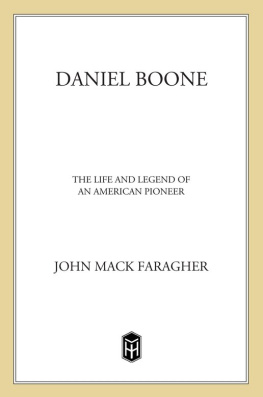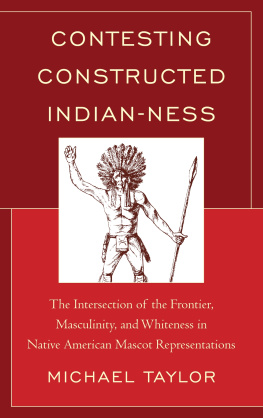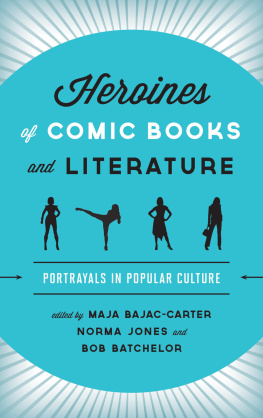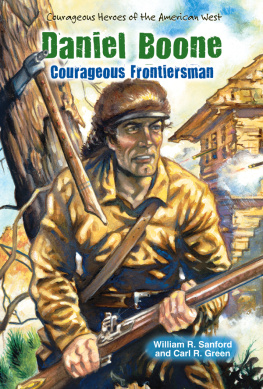FROM DANIEL BOONE TO CAPTAIN AMERICA
From
DANIEL BOONE
 to
to 
CAPTAIN AMERICA
Playing Indian in American Popular Culture
CHAD A. BARBOUR
www.upress.state.ms.us
Designed by Peter D. Halverson
The University Press of Mississippi is a member of the Association of
American University Presses.
Portions of appeared as Playing Indian and Performing Gender in 1940s and 1950s United States Comics, International Journal of Comic Art 15:2 (Fall 2013): 27897.
Portions of appeared as When Captain America Was an Indian: Heroic Masculinity, National Identity, and Appropriation, Journal of Popular Culture 48.2 (Apr. 2015): 26984.
Copyright 2016 by University Press of Mississippi
All rights reserved
Manufactured in the United States of America
First printing 2016
Library of Congress Cataloging-in-Publication Data
Names: Barbour, Chad A., author.
Title: From Daniel Boone to Captain America : playing Indian in American
popular culture / Chad A. Barbour.
Other titles: Playing Indian in American popular culture
Description: Jackson, Mississippi : University Press of Mississippi, 2016. |
Includes bibliographical references and index.
Identifiers: LCCN 2015046485 | ISBN 9781496806840 (hardback)
Subjects: LCSH: Comic books, strips, etc.United StatesHistory and
criticism. | Indians in popular cultureUnited States. | Masculinity in
popular culture. | SuperheroesHistory. | Comic strip
charactersHistory. | CourageMythology. | Frontier and pioneer
lifeWest (U.S.)Mythology. | West (U.S.)In popular culture. | BISAC:
SOCIAL SCIENCE / Popular Culture. | LITERARY CRITICISM / Comics & Graphic Novels. | SOCIAL SCIENCE / Ethnic Studies / Native American Studies.
Classification: LCC PN6725 .B33 2016 | DDC 741.5/352997073dc23
LC record available at http://lccn.loc.gov/2015046485
British Library Cataloging-in-Publication Data available
IN MEMORY OF MY FATHER
CONTENTS
The Indian Male Body and the Heroic Ideal
Tecumseh and the Indians of Parkman and Cooper
From the Nineteenth to the Twentieth Century
The Frontier Mythos in Comics Adaptations
White Blood Turns Red
Playing Indian in US Comics
When Superheroes Play Indian
Heroic Masculinity, National Identity, and Appropriation
ACKNOWLEDGMENTS
THIS BOOK HAS BEEN IN PROGRESS FOR THE PAST FEW YEARS, AND OVER those years I have presented its ideas and arguments at various conferences: American Studies Association, Nineteenth Century Studies Association, Southwest Popular/American Culture Association, and Popular Culture Association. The feedback and questions received at these conferences have been of much assistance. Joe Sutliff Sanders and David Bennett also provided helpful feedback on an early version of the Captain America article.
A number of online resources have been quite useful in writing this book. Two websites have been invaluable in their collecting of and making available scans of public domain comic books, many of which are integral to this research: The Digital Comic Museum and Comic Book Plus. The Grand Comics Database has been a constant source of technical and publication details. The Comix Scholars listserv has provided me with a profound education in comics studies and its academic nuances.
At the University Press of Mississippi, the two anonymous readers provided insightful critique for the proposal and manuscript. Craig Gill has been most supportive and kind during the proposal and drafting process. As the book has entered its later stages, other staff at the University Press of Mississippi have proven most helpful, including Katie Keene, Courtney McCreary, and John Langston. I am grateful also to Lisa Williams for her meticulous copyediting.
In my formative years as a scholar, Dana Nelson provided guidance and advice that has resonated throughout my life and career. Dale Bauer was also a supportive mentor in those early years. Further back, I would also recognize Gail McDonald, Christopher Hodgkins, and Tom Kirby-Smith for encouraging me toward a life in scholarship.
At Lake Superior State University, my colleagues in English, Communication, and Language Studies have demonstrated ideal collegiality throughout the years. A sabbatical awarded by the university provided me with much-needed time toward the end of the manuscripts composition. The staff of Shouldice Library has assisted me in obtaining books and articles through interlibrary loan and ordering books when needed; their service cannot be overstated. My students over the years have provided me with the opportunity to try out some of these ideas in the classroom, but I would especially recognize the students in my honors seminar, Superheroes and American Culture, for their enthusiasm and ideas, as well as the Honors Program for allowing me to teach this course.
My mother, Beth, with her unconditional encouragement and love, has made more possible for me than she knows. My in-laws, Nelson and Cindy, treat me as one of their own, and to them I am grateful for their love and support. When I was an undergraduate, I met Julie through a shared love of poetry. As our friendship became something more, we shared and nurtured our respective passions, and then careers, in English. I cannot imagine my life in writing and scholarship without her, my iceblink luck. My daughter, Eleanor, with her questions, her positivity, and her grace pushes me to do better, to be better.
This book is dedicated to the memory of my father, Mike Barbour (19502005), whose light shines on.
FROM DANIEL BOONE TO CAPTAIN AMERICAINTRODUCTION
ON MAY 29, 2014, WASHINGTON, DCS NFL TEAM DECIDED TO EXECUTE a publicity maneuver in which Twitter users were encouraged to address Senator Harry Reid (a vocal opponent of the NFL teams mascot): Tweet @SenatorReid to show your #RedskinsPride and tell him what the team means to you. As some Twitter users immediately surmised, this was not a good idea. On Deadspin.com, Barry Petchesky collected some of the responses, which included the likes of this one from Twitter user @JamilSmith: #RacialSlurPride RT @Redskins: Tweet @SenatorReid to show your #RedskinsPride and tell him what the team means to you. Or this one from user @xodanix3: Dakota 38 were called redskins b4 largest mass hanging in us history. No #redskinspride here @SenatorReid. This tweet included an image of a newspaper article on the hanging that used the redskins name. Many other tweets expressed similar sentiments. While there were certainly tweets that supported or defended the use of the name, those that expressed resistance to and critique of the name illustrate the role that social media has come to play in protesting appropriation and racist depictions of Native Americans.







 to
to 